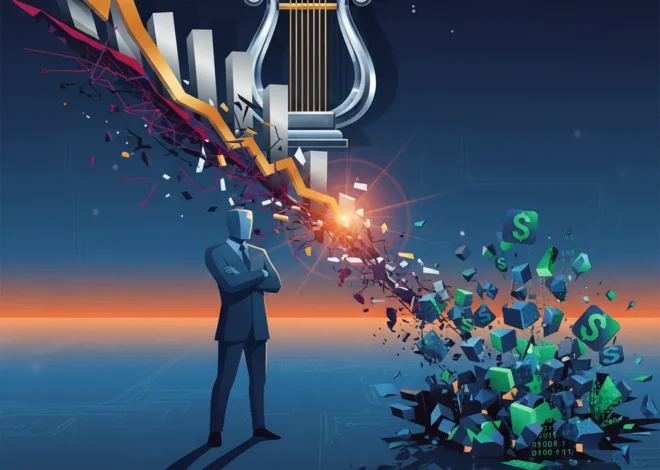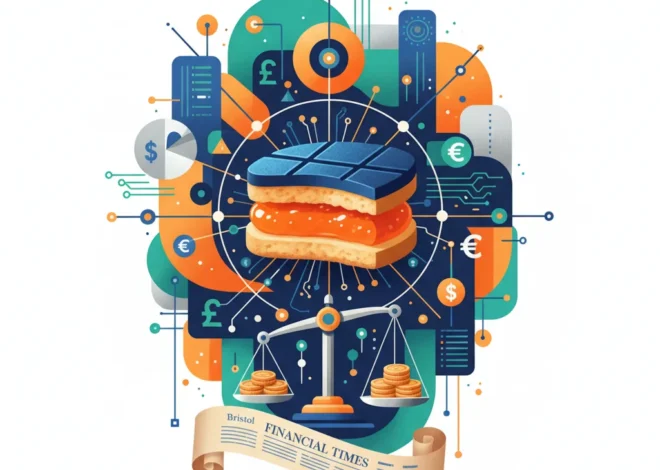Betting on Ballots: Truth Social’s Gamble on Prediction Markets and the AI That Will Power Them
What if you could bet on the next president with the same ease as you bet on the Super Bowl? What if financial markets and political outcomes weren’t just correlated, but one and the same? This isn’t a hypothetical from a dystopian novel; it’s the bold new reality taking shape on Donald Trump’s social media platform. Trump Media & Technology Group (TMTG), the parent company of Truth Social, is diving headfirst into the turbulent waters of prediction markets, announcing a plan to allow users to trade on the outcomes of political events, including the US presidential election.
According to a report from the Financial Times, TMTG is partnering with a UK-based company to integrate this functionality, effectively transforming a political social network into a financial trading platform. This move isn’t just a new feature—it’s a seismic collision of social media, fintech, and raw political ambition. For tech professionals, entrepreneurs, and developers, this development is more than just political theater; it’s a fascinating case study in high-stakes software implementation, the weaponization of data, and the immense technical challenges that lie ahead.
Let’s unpack the technology, the strategy, and the potential fallout of this unprecedented venture.
What Exactly is a Prediction Market?
Before we dive into the technical weeds, let’s clarify what we’re talking about. A prediction market, often called an “idea futures” market, is a platform where people can buy and sell “shares” in the outcome of a future event. Think of it like a stock market for events. If you believe a specific outcome will happen (e.g., “Candidate A will win the election”), you buy shares of that outcome. If you’re right, your shares become valuable. If you’re wrong, they become worthless.
The core theory is the “wisdom of the crowd.” The idea is that a market, aggregating the independent knowledge and analysis of thousands of participants, can often produce more accurate forecasts than individual experts or traditional polls. The Iowa Electronic Markets, a long-running academic project, has historically demonstrated impressive accuracy in predicting election results, often outperforming professional pollsters.
Truth Social’s plan is to take this concept, which has largely existed in niche academic or crypto circles, and drop it into the heart of a highly partisan, politically-charged social ecosystem. The result could be a powerful forecasting tool or a chaotic, misinformation-fueled casino. The difference will largely depend on the underlying technology.
The Tech Stack Behind the Bet: Cloud, SaaS, and Automation
Building a prediction market isn’t as simple as adding a “bet now” button. It’s a complex fintech application that demands a robust, scalable, and secure infrastructure. For TMTG, this represents a significant engineering challenge that touches every corner of modern software development.
First, there’s the core architecture. This platform will need to handle potentially millions of micro-transactions in real-time, especially during high-traffic events like a debate or on election night. This requires a sophisticated backend built on a resilient cloud infrastructure. Whether they leverage a major provider or continue to build on Rumble’s cloud platform, the system must be designed for low latency and high availability. Any downtime during a critical moment could be catastrophic for user trust and the market’s integrity.
This functionality will likely be delivered as a SaaS (Software as a Service) integration. The partnership with a UK firm suggests TMTG is licensing a white-label solution, which they will then need to deeply integrate into their existing platform. This involves complex API calls, data synchronization, and a seamless user experience—a non-trivial task for any engineering team.
Furthermore, automation will be the lifeblood of this market. Automated systems will be required for:
- Order Matching: Instantly connecting buyers and sellers of contracts.
- Market Making: Algorithms that provide liquidity to ensure there’s always someone to bet against.
- Contract Settlement: Automatically paying out winnings once an official outcome is declared.
- Compliance Monitoring: Using automated checks to flag suspicious activity for regulatory review.
The programming involved is highly specialized, borrowing from the worlds of high-frequency trading and online gaming. The choice of programming languages and frameworks will directly impact the platform’s performance and security. The Day the Internet Stood Still: Deconstructing the AWS Outage and Its Domino Effect
The AI Co-Pilot: Machine Learning in Prediction Markets
This is where things get really interesting for the tech-savvy. The data generated by this prediction market will be a goldmine, and artificial intelligence is the key to unlocking its value. While the “crowd” provides the raw signal, machine learning (ML) models can refine, analyze, and even act on that signal in ways humans can’t.
Here are a few ways AI will inevitably be woven into this ecosystem:
- Predictive Analytics: ML models can be trained on the market’s historical data, along with external data sources (news sentiment, polling data, social media trends), to generate even more accurate forecasts. An AI could potentially identify market inefficiencies or predict shifts before they become obvious.
- Sentiment Analysis at Scale: Imagine an AI that constantly scrapes Truth Social posts, comments, and news articles, gauging real-time sentiment shifts. This sentiment score could be a powerful input for automated trading algorithms, allowing them to react to breaking news faster than any human.
- Fraud and Manipulation Detection: This is perhaps the most critical application. A politically charged market is a prime target for manipulation. Sophisticated AI algorithms will be the first line of defense, tasked with identifying non-human behavior (bots), coordinated betting rings designed to artificially inflate a candidate’s chances, and other forms of market abuse. This is a massive cybersecurity challenge where machine learning is not just helpful, but essential.
This firehose of data and the AI tools used to analyze it could create a powerful new form of political intelligence, one that campaigns and media outlets would pay a fortune to access.
Prediction Markets vs. Traditional Polling: A New Paradigm?
For decades, polls have been the primary tool for gauging public opinion. However, they’ve faced a crisis of confidence, with several high-profile misses in recent election cycles. Prediction markets offer a different approach. The table below compares the two.
Here’s a breakdown of how these two forecasting methods stack up:
| Feature | Traditional Polling | Prediction Markets |
|---|---|---|
| Data Source | Responses from a sampled group of individuals. | Real-money trades from a self-selected group of participants. |
| Incentive | Civic duty, small non-monetary rewards. | Direct financial profit for being correct. |
| Update Frequency | Static; updated periodically (daily, weekly). | Dynamic; updates in real-time, 24/7. |
| Potential for Bias | Sampling errors, social desirability bias (respondents not being truthful). | “Echo chamber” effects, manipulation, participation limited to those with capital. |
| Cost | Expensive to conduct high-quality polls. | Can be cheaper to operate once the software platform is built. |
While prediction markets have their own flaws, their key advantage is that participants have “skin in the game.” Proponents argue this forces a more rational, less emotional form of analysis. However, on a platform like Truth Social, it’s an open question whether this financial incentive can overcome powerful partisan biases.
The Startup Playbook and the Monetization Game
From a business perspective, this is a shrewd move for TMTG, a company that has seen a volatile stock performance and is under pressure to find new revenue streams. This isn’t just about ad dollars anymore; it’s a direct play in the fintech space, targeting the same user base that has flocked to meme stocks and crypto.
This venture positions Truth Social not just as a social network, but as a hub for a specific political-financial ecosystem. It’s a strategy that other niche platforms and startups in the “alt-tech” world will be watching closely. By integrating financial services, TMTG is dramatically increasing user engagement and the potential for monetization through transaction fees (the “rake”).
This also represents a significant moment of innovation, albeit a controversial one. While established platforms like Facebook and X (formerly Twitter) have shied away from such features due to regulatory and PR risks, TMTG is leaning into its brand as a disruptive, anti-establishment force. It’s a high-risk, high-reward strategy that could either legitimize the platform as a serious fintech player or backfire spectacularly if it’s plagued by technical failures, manipulation, or regulatory crackdowns. The Commodity Futures Trading Commission (CFTC) in the U.S. has historically been hesitant to approve election-based futures contracts, creating a significant legal hurdle.
The Unseen Risks: Cybersecurity and the Gamification of Democracy
Beyond the business strategy and technical implementation lies a minefield of ethical and security risks. The platform will need a world-class cybersecurity posture from day one.
Imagine the scenarios:
- A state-sponsored DDoS attack on election night, aimed at sowing chaos by taking the market offline.
- Sophisticated phishing campaigns to steal user funds and credentials.
- The injection of “fake news” onto the social platform itself, specifically designed to manipulate market prices for a quick profit.
But the biggest risk may be more philosophical. What happens when we put a price on democratic outcomes? Does it encourage more informed participation, or does it reduce civic duty to a financial gamble? The “gamification” of the election could cheapen the process, making it more about winning a bet than engaging in substantive debate. It could also deepen political divides, as losing a bet feels far more personal and infuriating than simply seeing your preferred candidate lose an election.
The Code Red Shift: Why Silicon Valley's Titans Are Ditching Liberalism for the New Right
Conclusion: A Brave New World of Political Tech
Truth Social’s foray into prediction markets is far more than a gimmick. It is a landmark event at the intersection of technology, finance, and politics. It represents a bold attempt to create a self-contained ecosystem where political discourse and financial speculation are one and the same. For the tech world, it’s a live experiment in building and securing a high-stakes, real-time financial platform under the most intense political spotlight imaginable.
The success of this venture will hinge on the quality of its software, the resilience of its cloud infrastructure, and the intelligence of the AI systems tasked with protecting it. But its legacy will be determined by a much larger question: Is the “wisdom of the crowd” a powerful tool for truth, or is it just another algorithm to be gamed? The 2024 election might just give us the answer.


